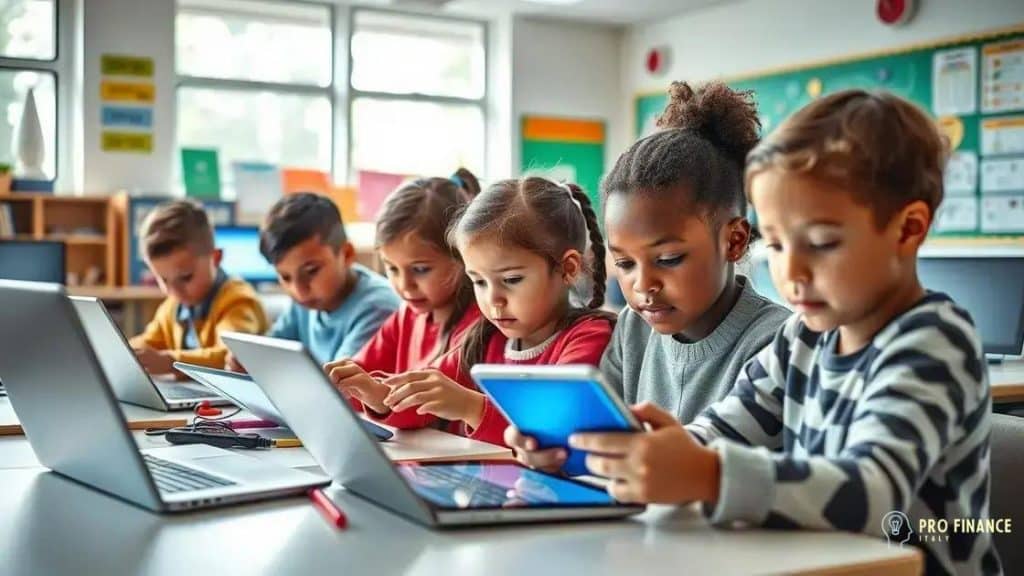Digital literacy as a foundational skill for future generations

Digital literacy is the essential skill set required to effectively use technology and navigate online environments, crucial for education and future employment opportunities.
Digital literacy as a foundational skill for future generations plays a crucial role in navigating today’s tech-savvy world. Have you thought about what this means for our kids?
Understanding digital literacy
Understanding digital literacy is crucial in the modern age. It encompasses the skills and knowledge needed to effectively use digital devices and the internet. These skills are essential for communication, learning, and accessing information.
What is Digital Literacy?
Digital literacy refers to the ability to find, evaluate, and communicate information using digital technology. It’s more than just knowing how to use a computer or a smartphone. It involves
- Understanding how to navigate websites
- Recognizing reliable sources of information
- Being able to communicate safely online
- Using digital tools for problem-solving
These skills help individuals participate fully in society, work environments, and personal relationships. In today’s world, where technology is pervasive, possessing digital literacy is almost like reading and writing.
Why is Digital Literacy Important?
Digital literacy enables people to take advantage of numerous opportunities. It plays a vital role in education, where students utilize technology to enhance learning experiences. Furthermore, employers increasingly seek workers who can adapt to a tech-driven workplace.
As technology evolves, keeping up with these changes is essential. For instance, online learning platforms require effective digital literacy to navigate courses and complete assignments. Without this skill set, students may struggle to succeed academically.
Digital literacy also empowers individuals to make informed decisions. It allows users to access information regarding health, finance, and civic rights. In a world filled with misinformation, being able to discern the truth becomes critical.
By fostering strong digital literacy skills, we prepare future generations for success both now and in the years to come. Transitioning from a passive consumer of content to an active creator is a vital aspect of this skill. Understanding and employing these abilities can transform how individuals engage with the world around them.
The importance of digital skills in education

The importance of digital skills in education cannot be overstated. In today’s technology-driven society, students must be equipped with the skills to effectively use digital tools. This preparation not only impacts their academic performance but also their future career prospects.
Enhancing Learning Experiences
Digital tools create interactive learning environments. Students engage with technology in ways that make learning more dynamic. For example, educational software can provide personalized feedback, making lessons more effective.
- Access to online resources for better research
- Collaboration through digital platforms
- Visual learning through multimedia content
- Real-time communication with teachers and peers
These aspects allow students to take more control over their learning process. By developing digital skills, they can adapt to various educational tools and resources.
Career Preparation
As students build digital skills, they gain confidence for their future careers. Employers now seek candidates who can navigate technology seamlessly. This demand continues to grow with the rise of remote work and digital collaboration.
Furthermore, students learn important skills such as critical thinking and problem-solving through technology. They learn how to evaluate information critically, which is essential in any field they pursue.
In addition, integrating technology into the classroom prepares students for lifelong learning. They develop a habit of seeking knowledge and staying updated with new tools and advancements.
Ultimately, emphasizing the importance of digital skills in education promotes student success both in school and in life. It equips them to thrive in an ever-evolving world, where technology plays a central role in nearly every aspect of life.
How digital literacy impacts future employment
How digital literacy impacts future employment is a vital topic for today’s job market. As technology continues to advance, employers increasingly prioritize candidates with strong digital skills. These skills not only make a candidate more attractive but are often essential for job performance.
Key Skills for the Job Market
Many jobs now require employees to use technology effectively. This includes managing data, using software programs, and communicating through digital platforms. Possessing digital literacy enables job seekers to stand out in a competitive landscape.
- Understanding cloud-based tools for collaboration
- Utilizing digital communication channels like email and video conferencing
- Analyzing data to make informed decisions
- Creating and maintaining a professional online presence
These skills enhance a candidate’s resume and improve their chances of securing employment. Companies look for individuals who can adapt quickly to new technologies. This adaptability is a core component of being digitally literate.
Bridging the Skill Gap
Digital literacy also plays a role in bridging the skill gap in various industries. As older generations retire, the workforce must fill their positions with individuals who have the necessary technological expertise. Those who are well-versed in digital tools will have better job opportunities.
In addition, developing digital literacy prepares workers for the future job landscape. Automation and artificial intelligence are changing the way we work. By fostering these skills, employees can stay relevant in their fields and can even identify new career paths that may not have existed before.
Employers appreciate candidates who take the initiative to learn and grow within the digital realm. This dedication can lead to promotions and increased responsibilities. By understanding how digital literacy impacts future employment, individuals can better prepare for their careers and navigate the evolving job market.
Tools and resources for developing digital literacy
Tools and resources for developing digital literacy are essential for anyone looking to enhance their skills in this area. With the right guidance and materials, individuals can become proficient in using technology for personal and professional growth.
Online Learning Platforms
There are many online platforms that offer courses to build digital skills. These platforms provide a wide range of resources, from beginner tutorials to advanced courses in specific software and tools. Some popular online learning options include:
- Coursera: Offers courses from universities on digital tools and skills.
- edX: Provides a variety of free courses on technology and digital literacy.
- Codecademy: Focuses on teaching coding and programming skills through interactive modules.
- Khan Academy: Offers user-friendly resources for learning various digital subjects.
Utilizing these platforms enables learners to progress at their own pace. This flexibility is important for balancing other responsibilities while building digital literacy.
Interactive Websites and Apps
Numerous websites and applications are designed to strengthen digital skills interactively. These tools make learning engaging and can turn practice into an enjoyable experience. Here are some examples:
- Duolingo: An app for learning new languages with a digital twist.
- Canva: A design tool that helps users create visually appealing graphics easily.
- Google Workspace: Familiarizing with tools like Docs, Sheets, and Slides enhances productivity.
By practicing with these applications, individuals can enhance their competence and feel more confident in their digital literacy.
Additionally, community resources such as libraries and local workshops offer valuable support. Many libraries provide classes on basic computer skills or host tech-focused events. These resources can be especially helpful for those who prefer face-to-face learning environments or need personal guidance.
Finally, joining online forums and communities can also provide support and insights into digital literacy. Sites like Reddit and specialized Facebook groups often have members sharing tips, resources, and experiences related to technology.
Strategies for fostering digital literacy at home
Strategies for fostering digital literacy at home are essential for helping children thrive in a tech-driven world. By creating an environment that emphasizes learning and exploration, parents can significantly enhance their child’s digital skills.
Encourage Exploration
One effective method is to encourage children to explore technology. Allow them to use devices for various purposes, whether for schoolwork or leisure activities. By promoting safe exploration, children learn how to navigate different tools and platforms.
- Set up guided internet searches on topics of interest.
- Introduce them to educational apps and games.
- Encourage them to create digital projects, like videos or blogs.
Engaging with technology in playful ways can boost their interest while enhancing their digital literacy.
Set Technology Limits
While exploration is important, setting reasonable limits is crucial. It’s essential to establish screen time rules that balance technology use with other activities. This approach helps develop a healthy relationship with technology.
Incorporate family activities that encourage interaction without screens. For instance, you can have family game nights or outings, which provide opportunities for face-to-face communication while still allowing for digital engagement during designated times.
Additionally, sharing the responsibility of using technology responsibly creates a culture where everyone learns to engage mindfully. Discuss online safety practices, such as protecting personal information and identifying reliable sources.
By modeling appropriate tech behaviors, parents can show children how to make thoughtful choices about their online presence. Engaging in conversations about digital citizenship also helps children understand the impact of their online actions.
Utilize Available Resources
Many resources are available to assist in developing digital literacy skills at home. Libraries often provide free access to workshops and classes related to technology. Online platforms also offer courses designed for families to learn about digital tools together.
Parents can take advantage of these resources to strengthen their own skills while helping their children. Learning alongside them fosters a collaborative environment, making the experience enriching for all.
With these strategies in place, families can work together to nurture a strong foundation in digital literacy, preparing children for a successful future.
In conclusion, fostering digital literacy at home is crucial for preparing children for the future. By encouraging exploration, setting reasonable limits, and utilizing available resources, parents can significantly enhance their child’s skills in navigating technology. These strategies not only improve their digital competence but also help them become responsible digital citizens. By working together, families can create a supportive environment that nurtures essential digital skills.
FAQ – Frequently Asked Questions about Digital Literacy
What is digital literacy?
Digital literacy refers to the ability to effectively use digital technology, communication tools, and networks to access, manage, and evaluate information.
How can I encourage my child to develop digital skills at home?
You can encourage digital skills by allowing your child to explore technology, setting reasonable screen time limits, and providing access to educational resources.
Why is digital literacy important for future employment?
Digital literacy is important for future employment because many jobs require the ability to use technology effectively and adapt to new tools as they emerge.
What resources can help improve digital literacy at home?
Resources like online courses, educational apps, and local library workshops can help improve digital literacy skills at home.





